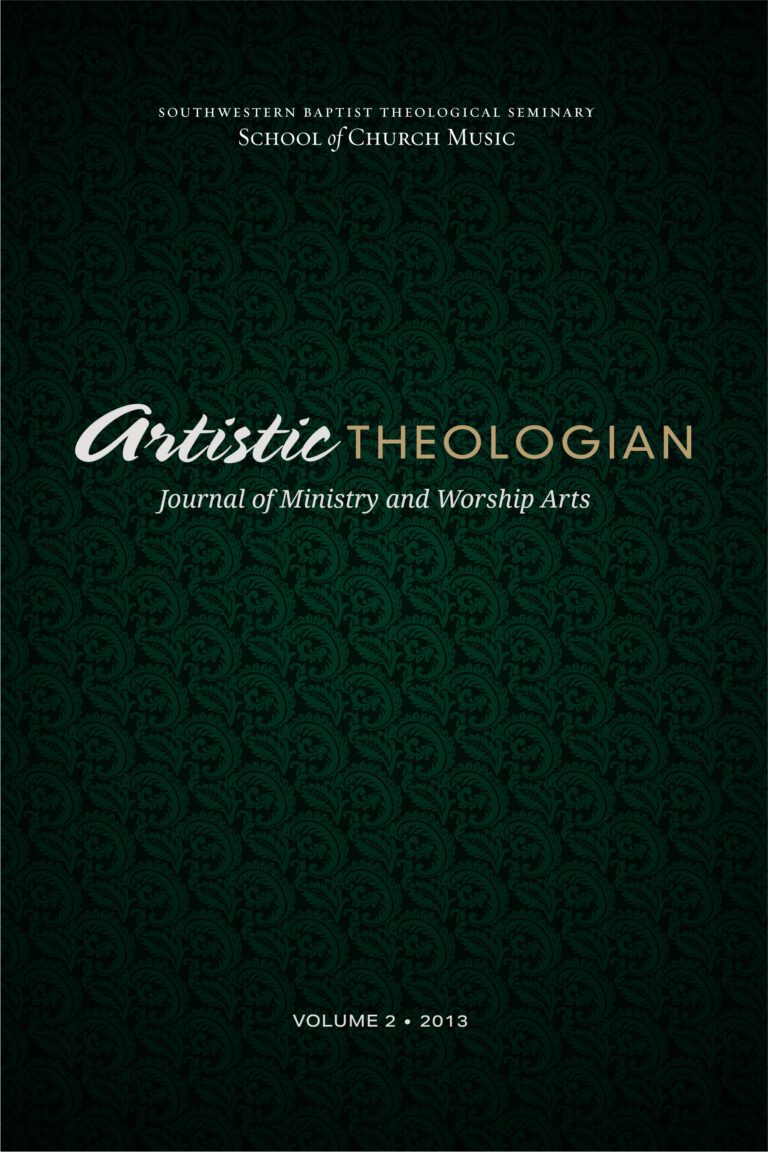
Worship Ministry: An Intersection of Ideas
Artistic Theologian
Volume 2, Summer 2013
Editor-in-Chief: John E. Simons
The Psalter Reclaimed: Praying and Praising with the Psalms, by Gordon Wenham. Wheaton, IL: Crossway, 2013. 205 pp. $15.99.
Whether times of praise or times of mourning, seasons of birth or seasons of death, the psalter speaks to a host of situations. Wenham, an Old Testament scholar, writes this introduction to the psalter to reorient the church with the breadth of its liturgical function. The psalms, though used in worship from the creation of the tabernacle, have seen limited usage in the present-day church. The Psalter Reclaimed attempts to recover the use of even the imprecatory psalms, and casts a vision for worship in the church that relies heavily on the psalter.
The question, What are we doing singing the psalms?, is the initiation point for exploration of this study of the psalter. Wenham traces the record to their liturgical function, seeking to clarify why the psalms were sung rather than recited. He finds this clarification in the writings of church father Athanasius: “For to sing the Psalms demands such concentration of a man’s whole being on them that, in doing it, his usual disharmony of mind and corresponding bodily confusion is resolved, just as the notes of several flutes are brought to harmony by one effect” (17).
The structure of the psalter is not just for singing, but also memorization. Wenham cites Griffith’s assertion that most readers approach texts in a consumerist fashion, picking and choosing to read what they like and move on, but religious readers “see the work read as an infinite resource” (22). The speech act theory is then applied through this religious reader view. “The psalms teach us the fundamentals of the faith and instruct us too in ethics” (25). The speech act theory extends the role of the psalter: “Singing them commits us in attitudes, speech, and action” (25).
The psalter is a collection of prayers to God. Wenham urges that congregations not “miss the main point of the Psalms: they are designed to be prayed” (37). Churches are often guilty of choosing the psalms that are joyful or heartening; however, “we need to expand the scope of our prayers to take in the hurts of our world, not just its joys” (55). The church should be praying all the psalms.
In what is the strongest chapter in the book, Wenham presents the case for reading the Psalms canonically. He posits, using others’ scholarship, that not only the authors were under inspiration when writing the psalms, but that the compilers of the psalter were under divine inspiration in its organization. “If, as I think has been demonstrated, the psalms have been arranged thematically, by title, and by keywords to form a deliberate sequence, it is imperative to read one psalm in the context of the whole collection and, in particular, in relationship to its near neighbors” (77). The balance of the book considers the issues of messianic interpretation, ethics, the imprecatory psalms, and the nations in the psalms within the context of this canonical reading.
This work is of the highest scholarship and serves as an excellent introduction to the psalter, but is conceptually flawed. The book is largely a collection of articles and lectures given at different locations to groups of differing academic acumen. This publication lacks the editing necessary to allow these differing articles to speak clearly with a unified voice, making reading frustrating at times. Even though one author writes the work, it may be best thought of as a compilation of essays with a general editor.
For a work that is well supported academically, The Psalter Reclaimed lacks the original thought of the author throughout. From the beginning, Wenham carefully documents what the church fathers through present-day scholars have thought of the psalter. His presentation of their thoughts might lead one to an understanding of his own ideas; however, he never presents an original contribution other than the comparison of differing viewpoints.
The Psalter Reclaimed is a useful introduction to the psalter that would most effectively be read in individual chapters and not as a cohesive work. The book is written so that a cursory knowledge of theology is required to understand its assertions. Pastors, worship leaders, and students will find this volume useful as they grapple with understanding the psalter and its role in the worship of the church.
Robert Pendergraft
Southwestern Baptist Theological Seminary
Fort Worth, TX





